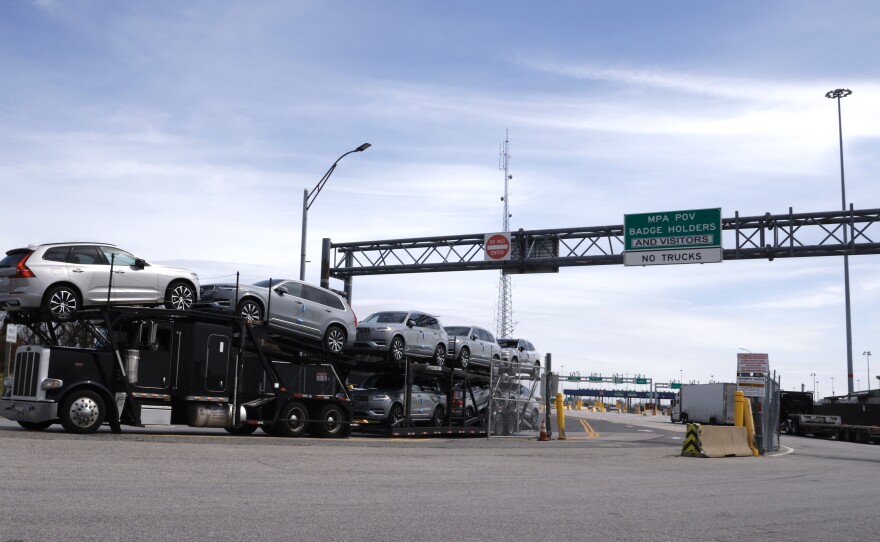When the Francis Scott Key Bridge was struck by a cargo ship and collapsed, it was a shocking disaster that took the lives of six men working on the bridge at the time.
It also blocked off much of the port.
That raised alarm bells in the auto industry — because the Port of Baltimore handles more cars and light trucks than any other port in the U.S., and clearing the debris could take months.
Automakers were quick to emphasize that they were adapting. GM says it is rerouting deliveries. Stellantis is working on "contingency plans." Mercedes says it has options. Mazda says it has yet to finalize alternatives to this "vital" port. But it's not easy.
Imported cars travel in special ships
That's because rerouting an imported vehicle is a lot more complicated than redirecting a shipping container. Not all ports are equally equipped to unload the vessels that carry vehicles — a special "roll-on roll-off," or ro-ro ship.
And once unloaded, vehicles need to be inspected for damage and often need to have accessories or electronics installed. There's important paperwork after a car comes off a ship before it can can go to a dealer.
That all happens at a port facility that's typically built right next to where the ships unload, and it's a big reason why the vessels can't be sent just anywhere — even if you can get them off the ship at another port, who's going to install the subwoofers and finalize the window sticker?
Still, companies have several options, even though these might cause delays.
Part of the Baltimore port can still accept vehicles
First, part of the Baltimore port that handles vehicles is still operational.
The Tradepoint Atlantic terminal is located at the mouth of the harbor, before the Francis Scott Key Bridge. Volkswagen and BMW operate there, and as a result, those two automakers expect no impacts from the disaster. On Wednesday, a ship with Volkswagens arrived and was able to dock like normal.
Tradepoint Atlantic says its operation is "well equipped to handle additional levels of [vehicle] cargo. Plans to accept redirected cargo are underway, including the ability to handle the increased capacity."
Unload cars at a different port and drive them to Baltimore
Second, automakers could unload vehicles from a ship at a different port altogether and then drive them to their Baltimore facilities for those crucial processing steps, like inspections and part installations.
The Port of New York and New Jersey says it would be able to take vehicles off a ship and put them immediately on a car carrier truck bound for Baltimore, three hours away.
"Our thoughts are with all of those impacted by this collapse," Bethann Rooney, port director, said in a statement, adding that the port "is proactively working with our industry partners to respond as needed and ensure supply chain continuity along the East Coast."
Those two options would also have a benefit for Baltimore as the city reels from the loss of a crucial bridge. They would allow at least some port jobs to continue, boosting the local economy, while the waterways are blocked.
Cars can also go to vehicle-focused ports farther away
As a third option, automakers could use a port farther afield, where they are already processing other vehicles.
For instance, Brunswick in Georgia is the second busiest port for vehicles after Baltimore — and Mercedes and Subaru, which import many vehicles through Baltimore, also have large processing operations there.
Officials at Brunswick say that the port has been contacted by companies as an interim solution while the Baltimore port is partially blocked, and that the port has unused capacity to process another 200,000 vehicles per year.
So that one port could absorb a significant chunk of the vehicles normally routed through Baltimore, which processed just shy of 850,000 vehicles last year. Other ports are also home to vehicle processing centers.
However, using a more distant port would mean a longer journey to dealerships. On the upside, because many vessels carrying vehicles make multiple stops up and down the East Coast, it might not require a detour at sea; that ro-ro ship would just unload more vehicles than originally planned at other ports, to make up for what it can't drop off at Baltimore.
Automakers and logistic companies could use a combination of strategies to address this shipping disruption.
Copyright 2024 NPR. To see more, visit https://www.npr.org. 9(MDAzMjM2NDYzMDEyMzc1Njk5NjAxNzY3OQ001))







